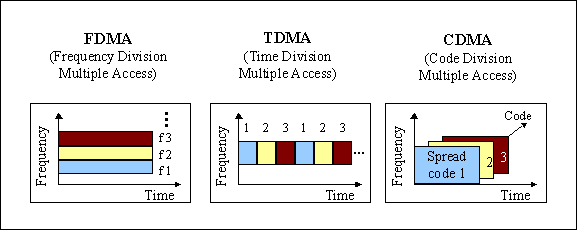Access Technologies (FDMA, TDMA, CDMA)
Access Technologies (FDMA, TDMA, CDMA)
FDMA: Frequency Division Multiple Access (FDMA) is the most common analog system. It is a technique whereby spectrum is divided up into frequencies and then assigned to users. With FDMA, only one subscriber at any given time is assigned to a channel. The channel therefore is closed to other conversations until the initial call is finished, or until it is handed-off to a different channel. A “full-duplex” FDMA transmission requires two channels, one for transmitting and the other for receiving. FDMA has been used for first generation analog systems.
TDMA: Time Division Multiple Access (TDMA) improves spectrum capacity by splitting each frequency into time slots. TDMA allows each user to access the entire radio frequency channel for the short period of a call. Other users share this same frequency channel at different time slots. The base station continually switches from user to user on the channel. TDMA is the dominant technology for the second generation mobile cellular networks.
CDMA: Code Division Multiple Access is based on “spread” spectrum technology. Since it is suitable for encrypted transmissions, it has long been used for military purposes. CDMA increases spectrum capacity by allowing all users to occupy all channels at the same time. Transmissions are spread over the whole radio band, and each voice or data call are assigned a unique code to differentiate from the other calls carried over the same spectrum. CDMA allows for a “ soft hand-off” , which means that terminals can communicate with several base stations at the same time. The dominant radio interface for third-generation mobile, or IMT-2000, will be a wideband version of CDMA with three modes (IMT-DS, IMT-MC and IMT-TC).

7:49 AM
|
Categories
technology
|
This entry was posted on 7:49 AM
and is filed under
technology
.
You can follow any responses to this entry through
the RSS 2.0 feed.
You can leave a response,
or trackback from your own site.


0 comment:
Post a Comment